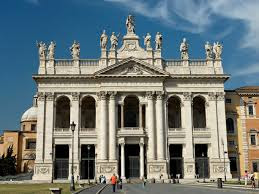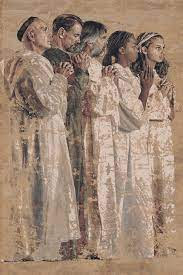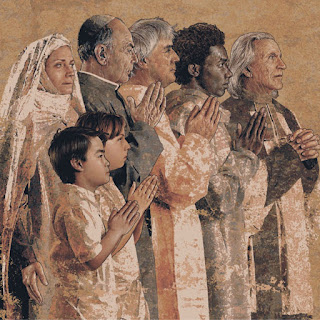
The incarnate Word is a sword of tender flesh, but a sword nonetheless. This is what Advent and Christmas reveal to us. This new liturgical year is ushered in by a gospel passage that contemplates the return of Christ at the end of history. The intense narrative comes to us from the very lips of the Lord of history and of the cosmos. Today Jesus wants to teach us to see Christmas—his first coming among us—as a reality closely intertwined with the Judgment of the world at his second coming. Scripture tells us that with the Incarnation of the Word the end of time already has begun. In Christ, God has uttered his last Word; there now only remains to see whether or not we want to hear it. God’s final Word comes at Christmas to walk the earth. But it is a radical Word, “sharper than any two-edged sword. [And] everything is naked and uncovered in the eyes of him to whom we must give an account”.
The interval of time between the historical Birth of Jesus of Nazareth and the Last Judgment is therefore not a time of empty waiting; it is, in fact, the kairós or divinely “appointed time” that is granted to us to make daily the great decision of either embracing or rejecting the incarnate Word, who already dwells among us in a hidden way. St Augustine says that time is a creation of God’s merciful compassion, meant to give us the opportunity to convert our hearts and return to the God who is always seeking us. Christmas, thus, is not primarily a ‘nice’ feast, consisting of easy nostalgia and childhood memories; Christmas is rather, as von Balthasar says, the celebration of the impotence of God’s love, a love that only by dying can demonstrate its omnipotence.
St Paul’s first message to us today is that the whole of Christian existence should be oriented toward the Second Coming of Jesus so that when our Lord comes he will find us ‘blameless in holiness’. This means that the whole Christian life should consist in waiting with active hope for the Lord who is about to come. But how can we practice this active hope? Its first concrete imperative, according to Paul, is the commandment to love, to love not only our fellow Christians but for all beings. Waiting for the coming of our Lord, we Christians should occupy ourselves only with loving, because only what love has created, suffered, and enjoyed will stand firm in the end. Loving and waiting are inseparable activities of the soul, and the gift of Advent is now given us that we may grow in love by waiting for the fulfillment of our greatest desire.
Secondly, however, again according to St Paul today, we must ask the Lord for a steadfast heart. Only divine power acting in us can ensure that our love of neighbor remains truly Christian and does not instead dissolve into a vague humanism or mere comfortable neighborliness. When we appear before Christ’s tribunal, he must see enough of his holiness in us that he will be able to welcome us with joy into the ranks of his saints. Consequently, Jesus’ words in this gospel are very strong, indeed shocking: Be vigilant at all times and pray, he declares, that you may have the strength to escape the tribulations that are imminent and to stand before the Son of Man. Our inevitable appearing before the Son of Man and standing steadfast before him is not a literary fiction or apocalyptic fantasy; for just under these images we perceive the marvelous reality of our supreme face-to-face encounter with our Creator and Redeemer, which is to say the ultimate event for which we were created when all the veils will be removed and everything will be seen in its most naked reality. Then, in an instant, in the twinkling of an eye, three realities will converge on a single plane: 1. the history of humanity both private and public; 2. the dazzling processes of nature and the cosmos; and 3. the sovereign preeminence of the Kingdom of God. And Christ the King will then manifest himself as glorious Lord and Judge over all three. It depends wholly on us and the choices we make right now whether we shall encounter him as ruthless Prosecutor or as long-awaited Bridegroom.
What Jesus commands his followers to do in the face of the cosmic catastrophes he describes is the very thing that for others is the worst catastrophe imaginable, but which for his disciples should instead be the source of the greatest hope: When these things begin to happen, he instructs us, stand erect and raise your heads, because your redemption is at hand. As if he said, ‘Go right into the catastrophe without hesitation because there am I awaiting you in the midst of it!’ The others have their hearts burdened because they have not offered them to God; they have not been attentive to the presence of God in their spirit and lives. As a result, they have dissipated and wasted their human substance in the blessed time allotted them in mercy, as if neither the future nor the Judgment nor God himself had any reality. They behave as if their own immortal human soul did not exist.
The Christian, to be sure, is by no means exempt from the vicissitudes of history or from the most serious earthly upheavals, such as this pandemic we’re presently enduring. Christians are vulnerable like everyone else and feel fear when faced with great threats. The only difference between believer and non-believer—but what a difference it is!—is that the Christian has persevered in believing the promise of the God who proclaimed through Jeremiah: I will cause a righteous shoot to spring up for David, who will exercise judgment and justice in the earth. In those days Judah will be saved and Jerusalem will live quietly, and [my people] will be called, ‘The Lord-our-justice’. Our justice (or righteousness) before God, and therefore our peace and joy and security, cannot possibly come from ourselves, from our virtues, actions, and intentions. Justice (that is, holiness) comes only from God, and from the growth in us of this Righteous Shoot planted in us by God as a gift of grace.
But once the Righteous Envoy has been received by us, once he has made his dwelling in us, then we ourselves must become what he is, because the Father has given him to us as truly ours; and therefore our own most intimate name becomes The-Lord-our-Justice. The holy life of God becomes our own most intimate and true life, by merciful participation. If we accept with faith and trust the sharp sword of the Word, this sword of judgment is transformed into a shoot rich in life, a sword of tender flesh which, like a good surgical instrument, communicates life and not death.
In the
face of extreme catastrophe, our peace can be based only on the vision that at
every moment we are progressing, through human events, towards the Person who
is our liberation, and nothing can impede this progress. The impetus that
is always driving us to go forward to meet our Judge is none other than this
same Lord-our-Justice, who lives so truly in our hearts that he has become
our very identity. Only in an intimate union with Christ, to the point of
sharing with him an identity of names, hearts, and wills, can we please the
Father and so be saved. Here, too, is the whole meaning of the Sacrifice we are
now about to offer on this altar. And so a new cycle of mercy, hope, and
salvation is offered us today, a new beginning. Let us not waste this gift of
sacred time through routine, indifference, distraction or plain old boredom.
Both God and our soul deserve infinitely better. Let us rise from our torpor!
Photograph
of Abbey glass by Brother Daniel. Today's homily by Father Simeon.














